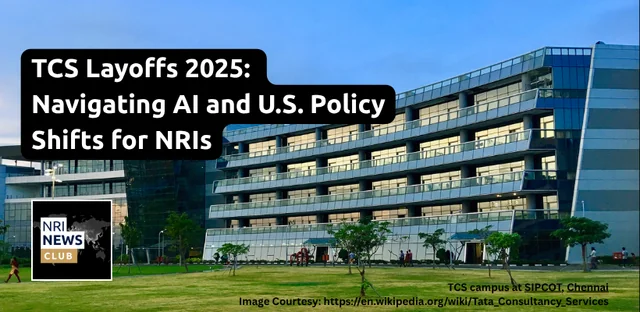In September 2025, Oracle’s latest wave of layoffs in Kansas City sent shockwaves through the local tech community, particularly affecting immigrant workers who joined the company through its $28.3 billion acquisition of Cerner in 2022. These job cuts, part of a broader restructuring driven by Oracle’s shift toward artificial intelligence (AI) and operational efficiency, have spotlighted the challenges faced by immigrants navigating employment, visa status, and cultural adaptation in the U.S. This article explores the intersection of corporate layoffs, U.S. immigration policies, and the personal experiences of immigrant workers in Kansas City, offering practical guidance and insights into their resilience and adaptation.
The Oracle-Cerner Acquisition and Its Fallout
Oracle’s acquisition of Cerner, a Kansas City-based healthcare technology giant, was heralded as a transformative move to revolutionize healthcare data systems. The deal, finalized in June 2022, brought 28,000 Cerner employees into Oracle’s fold, including a significant number of immigrant workers on H-1B visas and other work permits. However, the promise of growth has been overshadowed by significant workforce reductions. Since the acquisition, Oracle has eliminated over 5,000 jobs in Kansas City alone, with the latest layoffs in September 2025 affecting an undisclosed number of employees, many of whom were long-tenured Cerner staff.
(The layoffs, confirmed by multiple sources, were executed swiftly, with some employees notified via virtual meetings and terminated almost immediately. Oracle, now headquartered in Nashville, has not disclosed the exact number of affected workers, but the cuts are part of a nationwide effort to streamline operations and prioritize AI-driven technologies, such as Oracle’s Clinical AI Agent. For immigrant workers, these layoffs pose unique challenges, threatening their visa status and forcing them to navigate a complex immigration system while seeking new employment.
(Impact on Immigrant Workers
Immigrant employees, particularly those on H-1B visas, face heightened vulnerability during layoffs. The H-1B visa, commonly used in the tech industry, ties a worker’s legal status to their employment. If terminated, workers have a 60-day grace period to find a new employer willing to sponsor their visa or face potential deportation. In Kansas City, where Oracle employed over 6,000 workers in 2024 (down from 11,000 pre-acquisition), many immigrants from countries like India, Pakistan, and Nigeria were among those affected. These workers, often highly skilled in software development and healthcare IT, now face the dual challenge of job loss and immigration uncertainty.
(For example, Anil, a 35-year-old software engineer from India, moved to Kansas City in 2019 to work for Cerner. After the Oracle acquisition, he was optimistic about career growth but was laid off in September 2025. “I have 60 days to find a new job, or I might have to leave the country,” he says. “It’s not just about losing my job—it’s about losing the life I’ve built here.” Anil’s story reflects the precarious position of immigrant workers, whose contributions to Kansas City’s tech ecosystem are now at risk.
(“The layoffs hit us hard,” Anil shares. “I’ve been in meetings where we were told our work was critical, only to get a termination notice the next day. It feels like a betrayal.”
Navigating U.S. Immigration Policies
The U.S. immigration system is a labyrinth for many, particularly for skilled workers on temporary visas. The H-1B visa, which allows U.S. companies to employ foreign workers in specialty occupations, is capped at 85,000 annually, with fierce competition for slots. To maintain legal status, workers must secure a new sponsoring employer within the 60-day grace period post-termination. For Oracle’s laid-off workers, this timeline is daunting, especially in a competitive job market.
(Key visa requirements for H-1B holders include:
1. Proof of a specialty occupation: The job must require a bachelor’s degree or higher in a specific field, such as software engineering or IT.
2. Employer sponsorship: A new employer must file a Labor Condition Application (LCA) with the U.S. Department of Labor, confirming compliance with wage and working condition standards.
3. Timely filing: The H-1B transfer petition must be submitted to U.S. Citizenship and Immigration Services (USCIS) before the grace period expires.
For immigrants facing layoffs, securing a new sponsor is critical. Organizations like the Full Employment Council in Kansas City are stepping in to assist, offering resume-building workshops, job skills training, and networking opportunities. Clyde McQueen, President and CEO of the Council, emphasizes the importance of retaining talent: “We want to do as much as we can to keep that talent here.”
(Legal Guidance for Affected Workers
Navigating the immigration system during a layoff requires strategic planning. Practical steps for affected workers include:
1. Contact an immigration attorney immediately: Legal experts can guide workers through the H-1B transfer process or explore alternative visa options, such as the O-1 visa for individuals with extraordinary abilities.
2. Document employment history: Maintain records of job duties, performance reviews, and termination notices to support visa transfer applications.
3. Network proactively: Attend job fairs, connect with tech recruiters, and leverage platforms like LinkedIn to identify H-1B-friendly employers.
4. Explore self-petitioning options: For highly skilled workers, visas like the EB-1 or EB-2 with a National Interest Waiver may offer a path to permanent residency, bypassing employer sponsorship.
Nonprofits like the International Institute of Kansas City provide free or low-cost legal consultations for immigrants. “We’re seeing a lot of anxiety among tech workers right now,” says Maria Torres, an immigration counselor. “Layoffs don’t just affect your paycheck—they threaten your entire life in the U.S.”
Challenges of Job Loss and Cultural Adaptation
Beyond visa concerns, immigrant workers face emotional and cultural challenges in the wake of layoffs. Many moved to Kansas City for Cerner’s promise of stability, only to find themselves uprooted. The city, with a population of 510,000, has a growing tech scene but a less diverse cultural landscape compared to coastal hubs like San Francisco or New York. For immigrants, adapting to Kansas City’s Midwestern culture—marked by a slower pace and strong community ties—can be both a comfort and a challenge.
Rajesh, a 40-year-old former Cerner employee from Pakistan, describes the cultural adjustment: “Kansas City is welcoming, but it’s hard to find community when you’re not used to the American way of socializing. After the layoff, I felt even more isolated.” Rajesh, who is now job hunting, attends weekly meetups at the Kansas City Tech Council to rebuild his network. “It’s about starting over, but it’s tough when you’re worried about your visa every day.”
(Cultural adaptation is further complicated by language barriers and workplace expectations. Many immigrant workers are fluent in English but struggle with regional idioms or workplace norms, such as informal communication styles. For example, Aisha, a 32-year-old Nigerian data analyst, found that her direct communication style was sometimes misread as aggressive. “I had to learn to soften my tone to fit in,” she says. “It’s a small thing, but it matters when you’re trying to prove yourself.”
Tips for Cultural Integration
Successful integration requires effort and resources. Practical tips for immigrants include:
1. Join local organizations: Groups like the Kansas City Tech Council or the Ethnic Enrichment Commission host events that foster cross-cultural connections.
2. Learn regional customs: Understanding Midwestern traditions, like community potlucks or local sports culture (e.g., cheering for the Kansas City Chiefs), can build rapport.
3. Take language classes: Even fluent English speakers can benefit from accent reduction or business English courses offered by community colleges.
4. Engage with diaspora communities: Kansas City’s Indian, Pakistani, and African communities offer support networks for cultural preservation and mutual aid.
“Finding a balance between your heritage and your new home is key,” says Priya, an Indian immigrant who transitioned to a new tech role after the layoffs. “I cook biryani for my neighbors, and they invite me to barbecues. It’s a give-and-take.”
Success Stories Amid Adversity
Despite the challenges, many immigrant workers have turned layoffs into opportunities for growth. Take the story of Sanjay, a 38-year-old software developer from India who was laid off by Oracle in 2023. Using the 60-day grace period, he secured a role at a Kansas City-based startup focused on healthcare analytics. “The layoff was a wake-up call,” Sanjay says. “I realized I had skills that were in demand, and I didn’t have to stay tied to one company.” Sanjay’s new employer sponsored his H-1B visa, and he now mentors other immigrants navigating the job market.
(Similarly, Chidinma, a 29-year-old Nigerian immigrant, leveraged her Cerner experience to land a remote position with a Chicago-based tech firm. “I was devastated when I got the layoff notice,” she recalls. “But I used LinkedIn to connect with recruiters, and the Full Employment Council helped me polish my resume.” Chidinma’s story highlights the importance of resilience and community support in overcoming setbacks.
“Kansas City has a lot of opportunities if you know where to look,” Chidinma says. “The layoff pushed me to take risks I wouldn’t have otherwise.”
Policy Context and Corporate Responsibility
Oracle’s layoffs reflect broader trends in the tech industry, where companies are increasingly prioritizing AI and automation to cut costs. A 2024 Bloomberg report noted that Oracle’s Kansas City workforce shrank by over 5,000 since the Cerner acquisition, driven by campus closures and operational consolidation. The company’s focus on AI, including tools like the Clinical AI Agent, aims to enhance healthcare efficiency but has led to job losses for workers in traditional roles like software development and marketing.
(Critics argue that Oracle’s handling of the layoffs lacks transparency and empathy. Employees on platforms like TheLayoff.com have described the process as “cold” and “inconsiderate,” with some losing access to personal files due to abrupt system shutdowns. “It’s straight butchery, cuts made on cost alone, no regard for people or loyalty,” one anonymous poster wrote. These sentiments underscore the human toll of corporate restructuring, particularly for immigrants who face additional legal and cultural barriers.
(The U.S. government’s immigration policies further complicate the situation. The H-1B program, while critical for tech companies, has faced scrutiny for its restrictive nature. Proposed reforms under the Biden administration, including a 2024 rule to modernize H-1B eligibility criteria, aim to streamline the process but have yet to address the grace period’s short timeline. Advocacy groups like the American Immigration Council are pushing for extended grace periods and more flexible visa options to protect workers during layoffs.
The Role of Community Support
Kansas City’s response to the layoffs has been proactive, with organizations like the Full Employment Council and the KC Tech Council working to retain talent. “Cerner and Oracle’s presence has been nothing short of a game changer,” says Kara Lowe, CEO of the KC Tech Council. “Transitioning employees will likely remain in the area because their skills are highly sought after.” These efforts include job fairs, retraining programs, and partnerships with local startups to absorb displaced workers.
(For immigrant workers, community support is a lifeline. The International Institute of Kansas City, for example, offers workshops on resume writing, interview skills, and immigration law. “We’re not just helping people find jobs,” says Torres. “We’re helping them rebuild their confidence and their lives.”
Looking Ahead: Resilience and Opportunity
The Oracle layoffs in Kansas City are a stark reminder of the volatility of the tech industry and its impact on immigrant workers. Yet, they also highlight the resilience of a community determined to adapt and thrive. Immigrants like Anil, Rajesh, Sanjay, and Chidinma are navigating visa challenges, cultural adjustments, and job searches with determination, supported by local resources and their own ingenuity.
As Oracle continues to integrate AI and streamline operations, the future of Kansas City’s tech workforce remains uncertain. However, the city’s growing reputation as a tech hub offers hope. With startups, healthcare firms, and other industries seeking skilled workers, laid-off employees have opportunities to pivot. For immigrants, the path forward requires strategic planning, legal awareness, and cultural adaptability, but their contributions to Kansas City’s economy and diversity remain undeniable.
In the words of Sanjay, “This layoff didn’t break me—it pushed me to find my own strength. Kansas City is my home now, and I’m not giving up.” His story, like those of many others, underscores the power of resilience in the face of adversity, offering a blueprint for immigrants navigating the complex interplay of corporate change and immigration policy.



















0 Comments